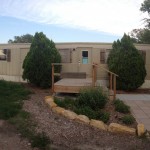By KARI BLURTON
Hays Post
Brendon McCampbell, director of Western Plains Animal Refuge, said the most emotional part of his volunteer work is turning animals away due to lack of space — now the lack of a building makes his job even more difficult.
The previous WPAR was located in a building a mile east of Ellis that was donated to the organization. However, McCampbell said the building is in need of renovations and not “really suited” for the needs of an animal shelter.
The organization’s animals have been placed in a foster home and adoptions continue, while McCampbell, the board of directors and volunteers work to raise funds and write grants to buy or construct a new facility suitable to house more animals with “triple capacity” than what the previous facility offered.

“It has been very difficult at times especially when people contact me about an animal that is going be euthanized or we get a number of people who contact us about animals and they are very mean and threaten to to do something — take their animals to the country and shoot them … abandon them — and I unfortunately can’t take every animal or we would be overburdened,” McCampbell said.
“There are some very emotional days. I just really care about theses animals, and I think the most meaningful way I can show that is through the shelter,” he said. “I think with the knowledge I have gained and the experience I have gained that the establishment of a new building will be whole lot better … and I can better engage with the community through it.”
The no-kill shelter was started by former Hays veterinarian Jessica Braun. After she closed her practice in 2011, McCampbell took over as WPAR director.
McCampbell is a graduate student at Fort Hays State University and frequently works 40 to 60 hours a week to ensure he can save as many animals as he can.
To donate to WPAR, volunteer, adopt or foster an animal go to WPAR website HERE or call (785) 259-3675 or email [email protected].
WPAR is a nonprofit, no-kill shelter and one of the only shelters in the state that can accept wildlife with the help of a licensed wildlife rehab coach.
All donated funds go directly toward the care of the animals, to their future building and, as McCambell said, “our many dreams” of expanding the organization.







